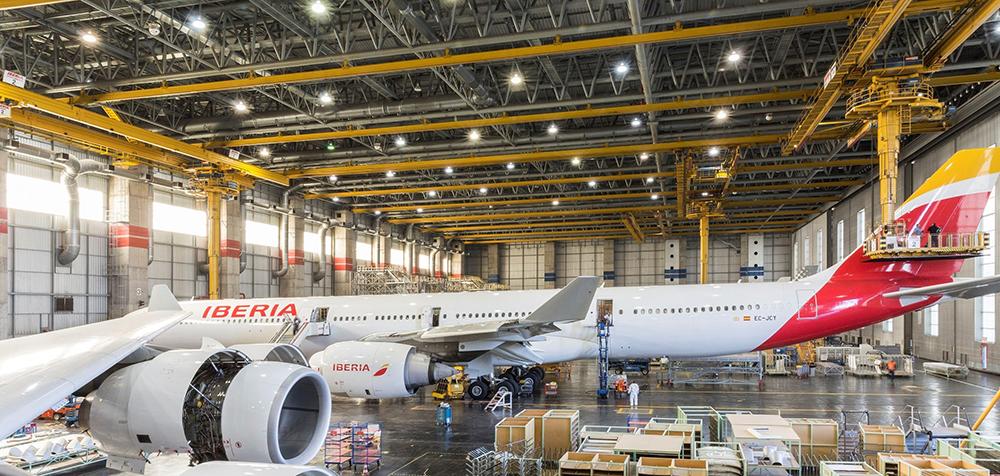
“A cheaper, more reliable solution” has to eventually dominate aircraft part procurement, argued Ivan Vallejo, director of the supply chain at Iberia Maintenance. “Let’s keep up the pressure, education and innovation,” he added.
Vallejo was making the case for more use of parts manufacturer approval (PMA) parts and designated engineering representative (DER) repairs at the Modification and Replacement Part Association’s Spring Virtual Event. In his presentation, Vallejo outlined Iberia’s own use of PMAs, its plans to use more of them and the hurdles and benefits that will come with wider use in the future.
The 2,800-employee, 18-bay Iberia Maintenance uses PMAs to serve its four main customer goals: safe flying, low costs, on-time departures and innovative methods. Prior to 2018, it exploited PMAs only for cabin textiles and leathers and fast-moving consumables. Next, it moved to PMAs for component spares and assemblies, looking for a total material management solution, including PMAs and used parts, for components.
Iberia Maintenance is now promoting PMAs and DERs on V2500 and CFM56 engines. In the future, Vallejo wants to expand these innovative alternatives on propulsion engines, APUs and a full suite of cabin parts—not just textiles and leather.
Vallejo cited several advantages of PMAs. Since they are FAA-approved, he says they are safe and “as good as” OEM parts. According to Vallejo, cost savings range from 60-70% on fast-moving consumables, 20-30% on the total costs of a major repair of a component and 30-40% on engine airfoils, the most costly parts in engine overhauls.
PMAs and DERS are also more reliable, leading to “longer time on wing and fewer AOGs,” Vallejo argued. He said PMAs also manifest better availability, which is especially important in today’s stressed supply markets. “Today, there are lots of part shortages, especially in fast-moving consumables and engine parts, not seen in PMAs,” he said.
DERs can also serve sustainability goals. Vallejo estimates that a conventional overhaul of a V2500 requires shipments resulting in 63 tons of CO2, much of which might be avoided by an innovative repair.
The more PMAs penetrate the MRO industry, the easier it will be for any one shop or operator to use them, so Vallejo calls for promotion with both operators and the crucial lessor community.
Vallejo stresses to Iberia’s customers that PMAs and DERs can save $1 million on a full engine overhaul. He also highlights other benefits, such as part availability, which can affect turnaround time.
However, Vallejo acknowledges that PMAs are a “difficult conversation” with many lessors. If an airline plans to fly an aircraft for the remainder of its useful life, PMA use is not so important to its lessor. But residual value is still an issue for many narrowbodies that will be returned with lots of life left.
Fortunately, leasing companies, which once were just “financial machines” in Vallejo’s view, now have more and better technical staff, who can be more easily convinced of PMA safety and technical merits. Then the lessors’ financial staff may be more willing to see the economic benefits of PMAs. A lessor that allows PMAs may be able to reduce the lessee’s maintenance reserve payments, making its lease offer more competitive. And an airline that pays less for maintenance can lease more aircraft.
Vallejo considered IATA’s settlement agreement on PMA use with major engine OEMs to be “useful, but not a game-changer.” He says the deal “put a foot in the door” and could help nurture the “network effect” that will help promote the PMA option.




